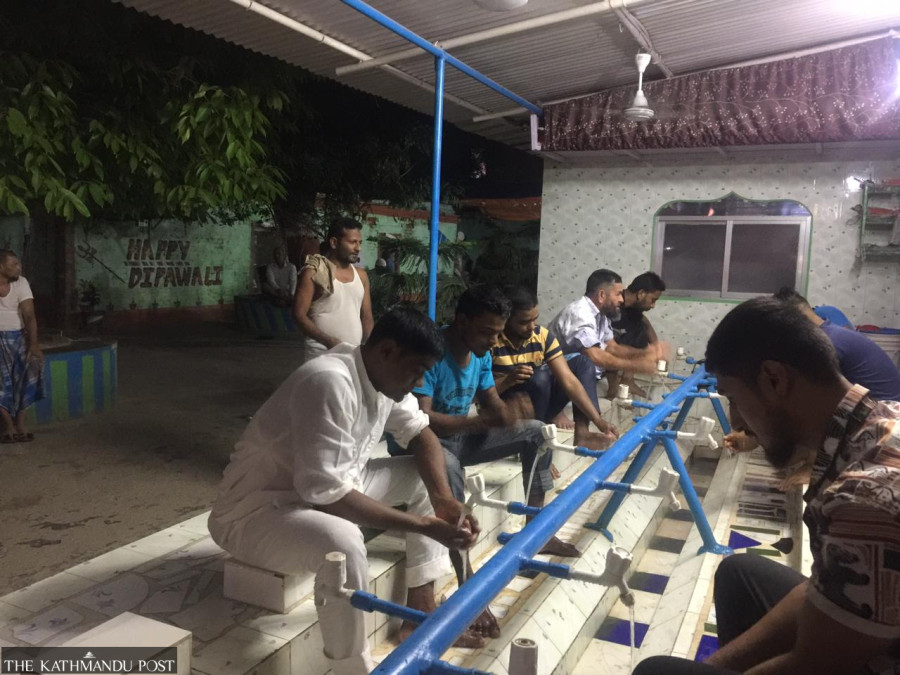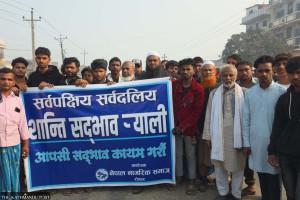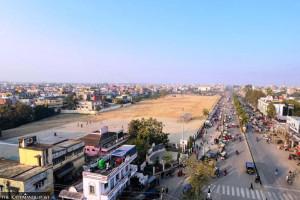Madhesh Province
Birgunj Prison lacks treatment facility for inmates
The law says any prison with over 500 inmates must have a hospital, and one with fewer than 500 a health post. This prison of over 1,200 inmates has neither.
Shankar Acharya
The lack of a medical centre on the premises of Birgunj Prison has deprived the prisoners of immediate medical care when needed.
The prison currently holds more than 1,200 prisoners, according to the data of the prison administration. Cases of minor health issues among the patients are reported daily but since there is no health centre on the prison premises, the patients are taken to Narayani Hospital for treatment. However, if a patient is in need of immediate care, delay in taking him to the hospital often leads to his worsening health condition and in some cases even death.
“In July 2018, 74-year-old inmate Dipan Shah fell ill. Shah, a chronic patient with high blood pressure and asthma, died on his way to a hospital,” said Ashok Kumar Baidya, former president of Birgunj Chamber of Commerce and Industries.
Baidya was also a member of Hanumani Devi Nathamal Baidya Sewa Samiti Birgunj, a non-profit organisation, which had handed over a two-room building inside the prison premises meant to be used as an infirmary for inmates eight years ago.
“The building was constructed by the Hanumani Devi Nathamal Baidya Sewa Samiti. We had set up a fully-equipped infirmary for the prisoners. We handed over the infirmary to the prison administration on March 14, 2015,” said Baidya. “But the building is being used by the prison administration as living quarters for the security personnel.”
Section 16 of the Prisons Act 2022, which took effect on November 26, states unequivocally that any prison with more than 500 inmates must have a fully-equipped hospital, and any prison with fewer than 500 inmates must have a health post. Birgunj Prison has neither.
When the donor group handed over the health centre building, they also provided beds and essential health equipment. The equipment lies unused while the beds are being used by the security personnel.
The lack of a treatment facility has not only posed problems for the inmates but also inconvenienced the prison administration since a large number of security personnel need to be deployed to escort a patient to hospital.
Madan Ghimire, the jailer, says despite the problems faced by both prisoners and the prison administration, they have no option but to use the infirmary as living quarters for security personnel.
“We have limited space. We can’t accommodate the number of security personnel we have,” said Ghimire. “We were short-staffed earlier and we couldn’t bring more security personnel because of a lack of space. That’s why we have to use the infirmary as living quarters.”
The prison administration, however, is planning to bring the infirmary into operation by making alternate arrangements to house the security personnel.
DSP Dipak Giri, spokesperson for the District Police Office, said it is the responsibility of the prison administration to provide necessary facilities to the security personnel.
“They had to use the infirmary because they don’t have space. This has gone on to affect the prisoners. It is time for the authorities to take this matter seriously because it affects both prisoners and security personnel,” said Giri.
Baidya from the Hanumani Devi Nathamal Baidya Sewa Samiti Birgunj says the prison administration should ensure the prisoners’ rights are not trampled upon while making considerations for the security personnel.
“Our motive was to do something good for the prisoners so they aren’t deprived of medical assistance. I am no authorised person to tell the prison administration how to use the infirmary but they should think about the health of the prisoners because they are also human and they have rights. The law also stipulates a healthcare centre in the prison but it is not being implemented,” said Baidya.




 14.24°C Kathmandu
14.24°C Kathmandu














